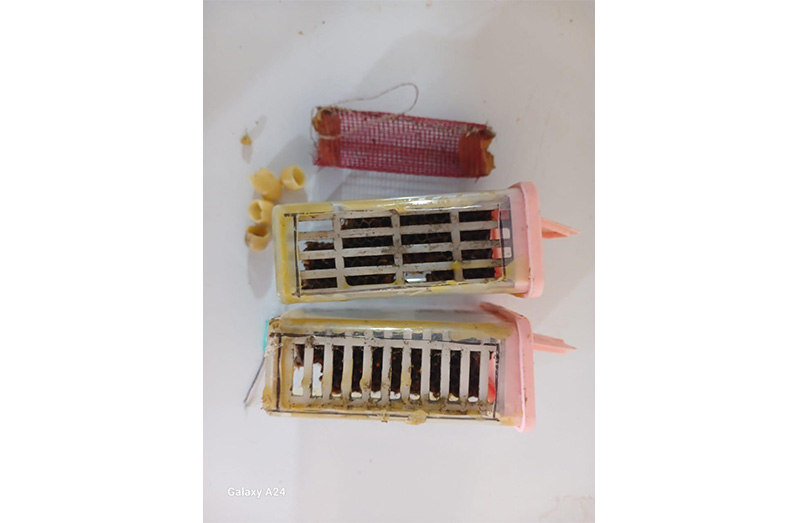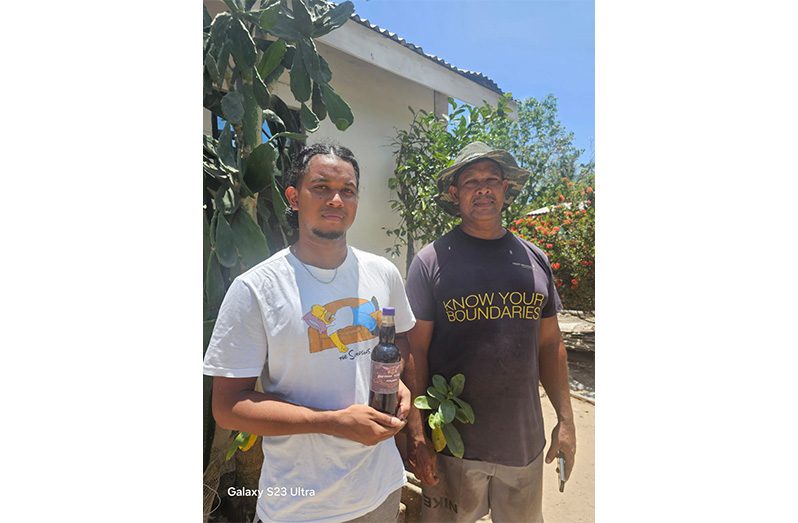AT 22 years old, Davidson Dutchin is certain about one thing: his love for beekeeping. Following in his father’s footsteps, he has developed a new and innovative method for rearing queen bees for his apiaries.
Davidson and his father are from Lovely Lass Village, on the West Coast of Berbice, where they operate their own apiaries and beekeeping ventures.
Their love for apiculture runs deep and was further enhanced when they participated in the Guyana Livestock Development Authority (GLDA) first-ever Honey Fest, hosted by the Ministry of Agriculture at the Guyana Lifestock Development Authority (GLDA) compound last year.
Their honey was touted as one of the best. Their bees are placed in hives along the sea defence, coastline, and among the mangroves, producing honey that is unique and one of a kind in taste, texture, and colour.
He told the Pepperpot Magazine that in beekeeping, he learned a great deal: that something so small — an insect — can bring such significant rewards and opportunities. For him, it has been an amazing journey.

Innovation with Simple Tools
Davidson added that being able to do what he loves, even with makeshift interventions, brings him great satisfaction. He is, however, pleased about the prospect of adding modern equipment to lighten the burden of manual labour in his venture.
A final-year student of the Guyana School of Agriculture (GSA), Davidson stated that in 2015 he began his beekeeping journey alongside his father — a farmer in every sense, with livestock, apiculture, swine, chickens, ducks, pigeons, and cash crops.
This year, in July, he began his own venture when he was gifted several hive boxes from GLDA to expand his operation.
He explained that collectively, between himself and his father, it was their first side business. He was drawn to introduce queen beekeeping after discovering how fascinating it was.
His simple methods are by no means ordinary. It is a well-thought-out project that Davidson designed using materials he had at home and in his environment, creating something that is both practical and impressive.
Queen Rearing and Honey Production
The young beekeeper told the Pepperpot Magazine that he has come a long way in producing honey — what began as a hobby quickly grew into a viable small business. He noted that annually, there are only two bee flows when honey can be extracted from the hives.
Through his queen bee-rearing method, he uses one box with 10 bees per crate, and every 21 days, a new queen bee is born.
He explained that the makeshift cells where the bees are stored serve as a safety intervention, trapping the queen bee before she is added to a hive to accelerate production.
Davidson revealed that he is currently rearing 85 boxes of Africanised bees in the backdam area, which produces a sweeter honey thanks to its location amid wild bush, mangroves, and fruit trees.
The Dutchin Farm Apiary, based in Lovely Lass Village, West Coast Berbice, is not only a family name and business but also their trademark of quality honey production.
Davidson is spearheading the development of an independent queen-rearing facility — a forward-looking innovation that will allow the family to expand their apiary sustainably while strengthening bee genetics in the region.
Tradition and Innovation Hand in Hand
Together, father and son now manage nearly 100 hives between them — a partnership of tradition and innovation. David’s steady, experience-honed wisdom is complemented by Davidson’s technical training, youthful drive, and willingness to learn.
Beyond the farm, Davidson is an enthusiastic participant in GLDA’s annual Honey Fest, a forum designed to showcase authentic honey, educate the public, and strengthen networks among beekeepers.
“Honey Fest is an excellent initiative. It gives us as beekeepers the opportunity to showcase our product, educate the public, and build networks of support. I am ecstatic about this year’s event,” he said, looking forward to Honey Fest 2025.
For Davidson, the festival has been invaluable for boosting business exposure, creating opportunities for collaboration, and deepening solidarity within Guyana’s growing apiculture sector.
As a new apiculturist, Davidson also admitted that his old protective gear has long expired and needs replacing. “In fact, I need several new suits for beekeeping,” he shared.
During a visit to their farm, he displayed a tattered suit, hoping he could source protective gear of good quality to withstand wear and tear.


.jpg)











